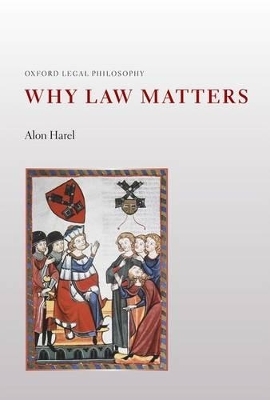
Why Law Matters
Seiten
2014
Oxford University Press (Verlag)
978-0-19-964327-1 (ISBN)
Oxford University Press (Verlag)
978-0-19-964327-1 (ISBN)
Why Law Matters argues that public institutions and legal procedures are valuable and matter as such, irrespective of their instrumental value. Examining the value of rights, public institutions, and constitutional review, the book criticises instrumentalist approaches in political theory, claiming they fail to account for their enduring appeal.
Contemporary political and legal theory typically justifies the value of political and legal institutions on the grounds that such institutions bring about desirable outcomes - such as justice, security, and prosperity. In the popular imagination, however, many people seem to value public institutions for their own sake. The idea that political and legal institutions might be intrinsically valuable has received little philosophical attention. Why Law Matters presents the argument that legal institutions and legal procedures are valuable and matter as such, irrespective of their instrumental value.
Harel advances the argument in several ways. Firstly, he examines the value of rights. Traditionally it is believed that rights are valuable because they promote the realisation of values such as autonomy. Instead Harel argues that the values underlying (some) rights are partially constructed by entrenching rights. Secondly he argues that the value of public institutions are not grounded (ONLY) in the contingent fact that such institutions are particularly accountable to the public. Instead, some goods are intrinsically public; their value hinges on their public provision. Thirdly he shows that constitutional directives are not mere contingent instruments to promote justice. In the absence of constitutional entrenchment of rights, citizens live "at the mercy of" their legislatures (even if legislatures protect justice adequately). Lastly, Harel defends judicial review on the grounds that it is an embodiment of the right to a hearing.
The book shows that instrumental justifications fail to identify what is really valuable about public institutions and fail to account for their enduring appeal. More specifically legal theorists fail to be attentive to the sentiments of politicians, citizens and activists and to theorise public concerns in a way that is responsive to these sentiments.
Contemporary political and legal theory typically justifies the value of political and legal institutions on the grounds that such institutions bring about desirable outcomes - such as justice, security, and prosperity. In the popular imagination, however, many people seem to value public institutions for their own sake. The idea that political and legal institutions might be intrinsically valuable has received little philosophical attention. Why Law Matters presents the argument that legal institutions and legal procedures are valuable and matter as such, irrespective of their instrumental value.
Harel advances the argument in several ways. Firstly, he examines the value of rights. Traditionally it is believed that rights are valuable because they promote the realisation of values such as autonomy. Instead Harel argues that the values underlying (some) rights are partially constructed by entrenching rights. Secondly he argues that the value of public institutions are not grounded (ONLY) in the contingent fact that such institutions are particularly accountable to the public. Instead, some goods are intrinsically public; their value hinges on their public provision. Thirdly he shows that constitutional directives are not mere contingent instruments to promote justice. In the absence of constitutional entrenchment of rights, citizens live "at the mercy of" their legislatures (even if legislatures protect justice adequately). Lastly, Harel defends judicial review on the grounds that it is an embodiment of the right to a hearing.
The book shows that instrumental justifications fail to identify what is really valuable about public institutions and fail to account for their enduring appeal. More specifically legal theorists fail to be attentive to the sentiments of politicians, citizens and activists and to theorise public concerns in a way that is responsive to these sentiments.
Professor Alon Harel is a Mizock Professor of law and member of the Centre for Rationality at the Hebrew University of Jerusalem. He is a co-editor of Jerusalem Review of Legal Studies, a member of the editorial board of Criminal Law and Philosophy and a member of the editorial board of New Criminal Law Review. He writes on legal and political philosophy, criminal law theory, constitutional law theory, law and economics and human rights.
PART I WHY RIGHTS MATTER; PART II WHY THE STATE MATTERS: DIGNITY, AGENCY AND THE STATE; PART III WHY CONSTITUTIONS MATTER: THE CASE FOR ROBUST CONSTITUTIONALISM
| Reihe/Serie | Oxford Legal Philosophy |
|---|---|
| Verlagsort | Oxford |
| Sprache | englisch |
| Maße | 162 x 240 mm |
| Gewicht | 530 g |
| Themenwelt | Geisteswissenschaften ► Philosophie |
| Recht / Steuern ► Allgemeines / Lexika | |
| Recht / Steuern ► EU / Internationales Recht | |
| Sozialwissenschaften ► Politik / Verwaltung ► Politische Theorie | |
| ISBN-10 | 0-19-964327-X / 019964327X |
| ISBN-13 | 978-0-19-964327-1 / 9780199643271 |
| Zustand | Neuware |
| Haben Sie eine Frage zum Produkt? |
Mehr entdecken
aus dem Bereich
aus dem Bereich
Der »progressive« Angriff auf Israel, Judentum und …
Buch | Softcover (2024)
edition TIAMAT (Verlag)
28,00 €
ein Vortrag
Buch | Softcover (2024)
Suhrkamp (Verlag)
10,00 €


